To see all of today’s study questions, click here.
https://youtu.be/lQZ8rGbSsrA
Thomas Fuller a British Minister wrote,
“A man apt to promise is apt to forget”.
Booker T. Washington describes meeting an ex-slave from Virginia in his book, ‘Up From Slavery’: there Brooker writes, “I found that this man had made a contract with his master, two or three years previous to the Emancipation Proclamation, to the effect that the slave was to be permitted to buy himself, by paying so much per year for his body; and while he was paying for himself, he was to be permitted to labor where and for whom he pleased.
“Finding that he could secure better wages in Ohio, he went there. When freedom came, he was still in debt to his master some three hundred dollars. Notwithstanding that the Emancipation Proclamation freed him from any obligation to his master, this black man walked the greater portion of the distance back to where his old master lived in Virginia, and placed the last dollar, with interest, in his hands.
Brooker goes on to say, “In talking to me about this, the ex-slave told me that he knew that he did not have to pay his debt, but that he had given his word to his master, and his word he had never broken. He felt that he could not enjoy his freedom till he had fulfilled his promise.” ( Douglas E. Moore: http://www.sermonillustrations.com/a-z/p/promise.htm).
Have you ever had one of those times when you were in a jam and cried out to the LORD, promising that if He just gets you out of this then you’ll do this or that thing? Do you think He actually keeps track of those promises that are made in haste or fear?
 And what about the vows we make when we think we are in love? Does God hold us accountable for those?
And what about the vows we make when we think we are in love? Does God hold us accountable for those?
In different parts of Europe locks are springing up and weighing down bridge spans. They look kind of cool. Some have thousands of them on a single span. Each lock is placed by a couple who are vowing that their lives are locked together and shall stay that way. It’s inspiring to see but some municipalities have had to remove the locks for structural reasons. So does that mean that the vows that the couples made are no longer valid? Does it change anything? Do circumstances change our vows to God and others? Or maybe just to others but not to God?
A couple of weeks ago we saw Jacob, the deceiver, running for his life because he had cheated his brother out of both his birthright and father’s blessing. On his first night out he pulled a cozy pillow under his head and encountered the Living God in his dreams.
God announced that He was the God of Abraham and Isaac, Jacob’s forefathers and then God makes covenant with Jacob. Really, God extends Abraham’s covenant to Jacob and promises that He will be with Jacob wherever he goes and will return him safely home to the land he now finds himself on.
It was then, you’ll remember, that Jacob made a promise back to God, “If God will be with me and will watch over me on this journey I am taking and will give me food to eat and clothes to wear so that I return safely to my father’s house, then the LORD will be my God and this stone that I have set up as a pillar will be God’s house, and of all that you give me I will give you a tenth.” Genesis 28:20-22 (NIV).
Do you think Jacob meant it? Does God really hold you to your word when you make those sort of deals with Him? Well let’s look at Jacob’s account in HIStory and see if it can help up get our stories right with God.
Turn with me to our last story from Genesis in this 52 week challenge. Genesis 35:1-5.
“Then God said to Jacob, “Go up to Bethel and settle there, and build an altar there to God, who appeared to you when you were fleeing from your brother Esau.” So Jacob said to his household and to all who were with him, “Get rid of the foreign gods you have with you, and purify yourselves and change your clothes. Then come, let us go up to Bethel, where I will build an altar to God, who answered me in the day of my distress and who has been with me wherever I have gone.” So they gave Jacob all the foreign gods they had and the rings in their ears, and Jacob buried them under the oak at Shechem. Then they set out, and the terror of God fell upon the towns all around them so that no one pursued them” (Genesis 35:1-5 (NIV)).
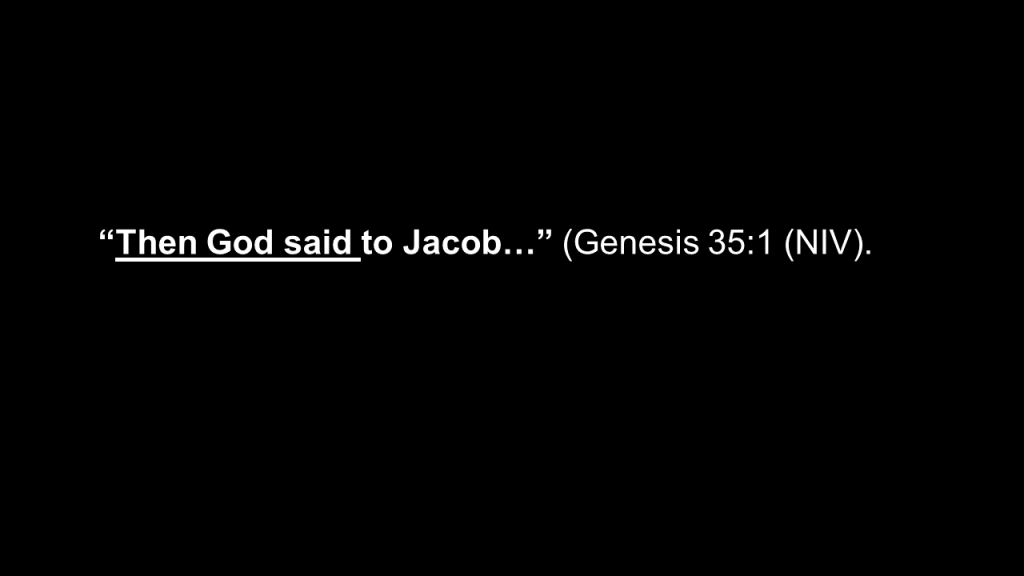 Well I suppose it’s unnecessary to point out the obvious. But then again.
Well I suppose it’s unnecessary to point out the obvious. But then again.
Who was it that initiated this conversation in verse 1?
“Then God said to Jacob,” (Gen. 35:1). You would almost think that a conversation is going on as the chapter begins wouldn’t you? “Then”, “Then God said”? It is one of those time references again like last week’s “6 days later” (Matthew 17:1). It demands us to know the context if we are going to arrive with a right understanding of what the author intents.
So what had Jacob been up to since we left him heading for Syria back in chapter 28, after he made that promise to God? Was it a short time afterward or are we many years later?
 In case you haven’t put it together yet, our underlying-lesson this month is context. It is incredibly important to know the context of a passage when we are choosing to use it for a principle to live by or passage to direct our lives. When we come to God’s word by faith, thinking is allowed! In fact much preferred! Faith is not the absence of reason.
In case you haven’t put it together yet, our underlying-lesson this month is context. It is incredibly important to know the context of a passage when we are choosing to use it for a principle to live by or passage to direct our lives. When we come to God’s word by faith, thinking is allowed! In fact much preferred! Faith is not the absence of reason.
To say a lot has happened to Jacob since chapter 28 would be a huge understatement!
Jacob went to Rebekah, his mom’s, homeland and found a two for one deal he couldn’t pass up. He ended up staying there 20 years paying off that deal to a father-in-law who kept changing the terms. Laban changed their arrangements 10 times and that after switching Leah for Rachel on the wedding day. But God was with Jacob, as promised, and blessed him with 11 sons and a daughter and a huge flock of goats and cattle and more. So much more that his brother-in-laws were getting jealous and his father-in-law repeatedly tried to cheat the deceiver (cf. 31:7).
The Bible says, the sins of the father may be passed on to the children but this certainly shows that those sins can come from mother’s side of the family too!
I suspect that God used the swindling father-in-law to help convince Jacob that it was time to go back to the Promised Land.
In Genesis 31:3 we read, “Then the LORD said to Jacob, “Go back to the land of your fathers and to your relatives, and I will be with you.” Here again we see that the promise from God continued. God had never left Jacob. This should be obvious by all the different ways that the goats were being born. But that’s story for another day.
God was still speaking very clearly to Jacob and directing him homeward. But was Jacob really listening?
Seems God often used dreams to direct Jacobs’s path. In Chapter 31 we read of Jacob, “In breeding season I once had a dream in which I looked up and saw that the male goats mating with the flock were streaked, speckled or spotted. The angel of God said to me in the dream, ‘Jacob.’ I answered, ‘Here I am.’ And he said, ‘Look up and see that all the male goats mating with the flock are streaked, speckled or spotted, for I have seen all that Laban has been doing to you. I am the God of Bethel, where you anointed a pillar and where you made a vow to me. Now leave this land at once and go back to your native land.‘” Genesis 31:10-13 (NIV).
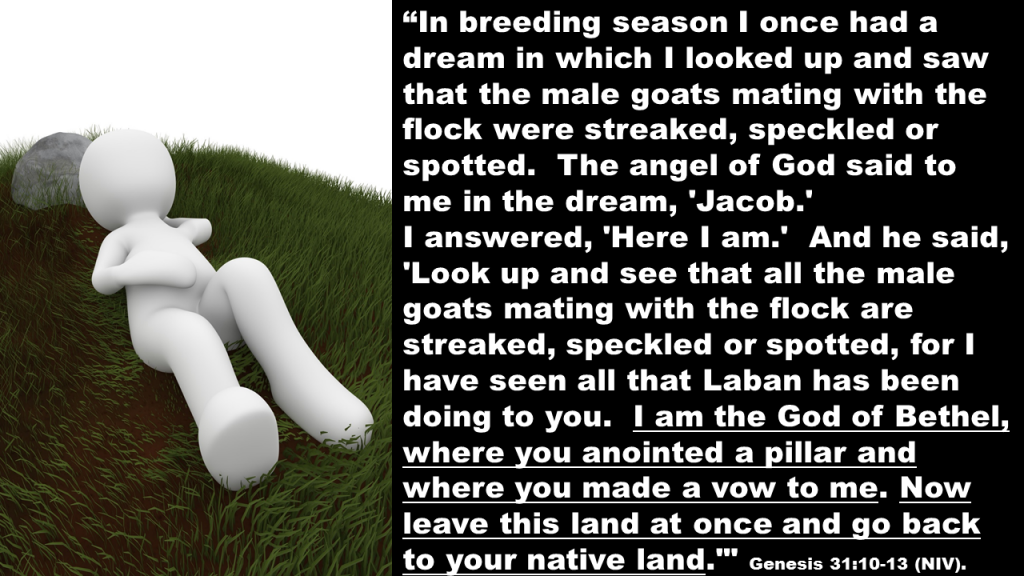 So clearly God did remember Jacob’s vow. Not only did HE remember it but God reminded Jacob of it as he persuaded Rachael and Leah that it was time for him to fulfill it. Time to head for home.
So clearly God did remember Jacob’s vow. Not only did HE remember it but God reminded Jacob of it as he persuaded Rachael and Leah that it was time for him to fulfill it. Time to head for home.
You see God has an excellent memory and is completely faithful when He promises something to some.
Numbers 23:19 says, “God is not a man, that he should lie, nor a son of man, that he should change his mind. Does he speak and then not act? Does he promise and not fulfill?”(NIV). But as Thomas Fuller said, “A man apt to promise is apt to forget”. Or at least try not to remember.
As Jacob convinces both Leah and Rachel, they pack up the camels and get ready to head for the Promised Land. But dear Rachel, the love of his life, and what he considered the better half of the two for one deal, couldn’t settle for all the cattle, sheep, goats, men and maid servants and all the other stuff that God had truly blessed them with. She stole her father’s gods as they left for Canaan.
Like Hindus these folks had an idol for everything. And those little carvings were often made out of precious metals and embedded with semi-precious stones so perhaps Rachel was, in a sense, taking with her what she considered her inheritance. Though she already knew by then that her father had cut her out of the will (Cf. Gen 31:14-21).
So with sons and daughters and herds numbering in the thousands they left for Jacob’s father’s homeland.
Well, his dad, Isaac, and his mom were actually long gone by then. Jacob was actually heading to the land where his brother Esau was.
Remember Esau? He was the reason that Jacob ended up with mom’s relatives in the first place. Esau outright said that he wanted to kill Jacob as soon as the mourning time had passed for Isaac.
But God promised Jacob: “Go back to the land of your fathers and to your relatives, and I will be with you.” Genesis 31:3 (NIV) and then insisted, “Now leave this land at once and go back to your native land” (Gen. 31:13).
Are you starting to get the picture?
Jacob was being chased out of mom’s homeland by uncle Laban back to dad’s homeland and was not too excited to get there. Why? Because as far as he was concerned brother, Esau, was just waiting to kill him. Talk about a rock and hard place!
So what’s a guy to do? Well when God says go you at least ought to start moving in that direction right?
Chapter 32 tells of Jacobs elaborate plan to hopefully soften Esau’s heart with some well-timed bribes. That sure sounds like God’s way of doing things right? Bribery? But did it work?
What was brother Esau’s response? Seems Esau decided to come out to greet Jacob personally with about 400 armed men. Thus adding to Jacob’s anxious, guilt ridden, fear. The fear that was already ruling his heart.
A guilty conscience plays havoc on even genuine gestures of forgiveness and may lead one to question God or at least having heard from God. But before Esau reaches Jacob there was that heart felt anxious prayer back to God for help.
“…Jacob prayed, “O God of my father Abraham, God of my father Isaac, O LORD, who said to me, ‘Go back to your country and your relatives, and I will make you prosper,’ …Save me, I pray, from the hand of my brother Esau,…'” Genesis 32:9-12 (NIV).
 And then just in case that didn’t work out Jacob sent ahead of him to Esau a few hundred choice animals, in waves, with his servants leading them, hoping to appease Esau. And then he sent his wife and kiddies to the other side of the stream to make sure they were out of harm’s way.
And then just in case that didn’t work out Jacob sent ahead of him to Esau a few hundred choice animals, in waves, with his servants leading them, hoping to appease Esau. And then he sent his wife and kiddies to the other side of the stream to make sure they were out of harm’s way.
Instead of trusting God’s promises and believing that God is good and would not take him to where his brother would be waiting to kill him, Jacob tries it his own way, safely separating himself from all the others. What do you think? Did God notice and approve of this ingenious plan?
Seems that God showed up again in the latter half of chapter 32.
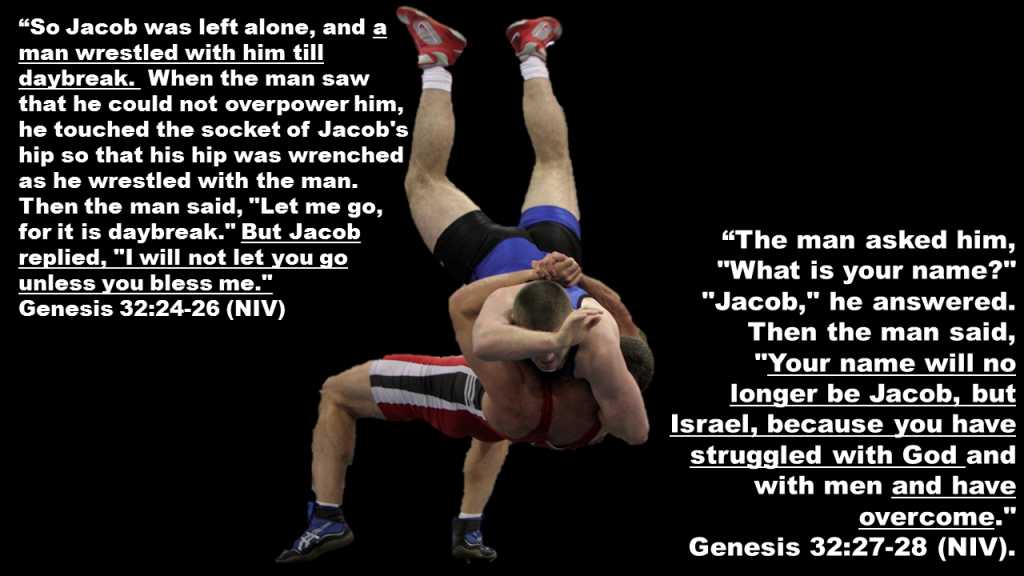 This time Jacob is found wrestling all night long with someone and refuses to let them go until that someone blessed him. “The man asked him, “What is your name?” “Jacob,” he answered. Then the man said, “Your name will no longer be Jacob, but Israel, because you have struggled with God and with men and have overcome.“ Genesis 32:27-28 (NIV).
This time Jacob is found wrestling all night long with someone and refuses to let them go until that someone blessed him. “The man asked him, “What is your name?” “Jacob,” he answered. Then the man said, “Your name will no longer be Jacob, but Israel, because you have struggled with God and with men and have overcome.“ Genesis 32:27-28 (NIV).
Now you would think that wrestling and be blessed by God would be enough to trust that all would be OK with Esau wouldn’t you?
I did say that lot’s had happened since Jacob started this journey right? Well immediately after limping from wrestling with God Jacob meets his brother Esau, who, of course, took the bribes, I mean gifts, even though Esau insisted they were unnecessary. And so these brothers reconcile.
Then Jacob immediately plays one more deceitful trick. He says to Esau that he’s coming home slowly because of the wives and kids, but instead Jacob’s old nature wins out yet again.
Instead of following Esau, even at a distant as he said he would, Jacob headed for Shechem and buys a plot of land on the outskirts. Where he sets up another alter to his God. But this time he get’s the Abram treatment of being in the wrong place at the wrong time. He doesn’t immediately hear from God. Why?
Have you read anywhere that God said go to Shecum and set up an alter to ME? Where was it that Jacob was suppose to go and set one up? (Hint – read verse one of today’s passage.)
It was at Shecum that Jacob learned a very hard lesson about not walking in the path God sets out for you. And the consequences of being in the wrong place at the wrong time.
His cheerful daughter Dinah went visiting the women of Shechem one afternoon and instead of having a great time she ended up raped by “Shechem son of Hamor the Hivite, the ruler of that area” (Genesis 34:2 (NIV). That in turn lead to Dinah’s brothers conceiving a plan and hotheadedly massacring all the men of Shechem, looting their households and carrying off their wives. It was a blood bath!
And when Jacob realized what had happened he “…said to Simeon and Levi, “You have brought trouble on me by making me a stench to the Canaanites and Perizzites, the people living in this land. We are few in number, and if they join forces against me and attack me, I and my household will be destroyed.” Genesis 34:30 (NIV). And then he apparently went to bed and caught some Zs. 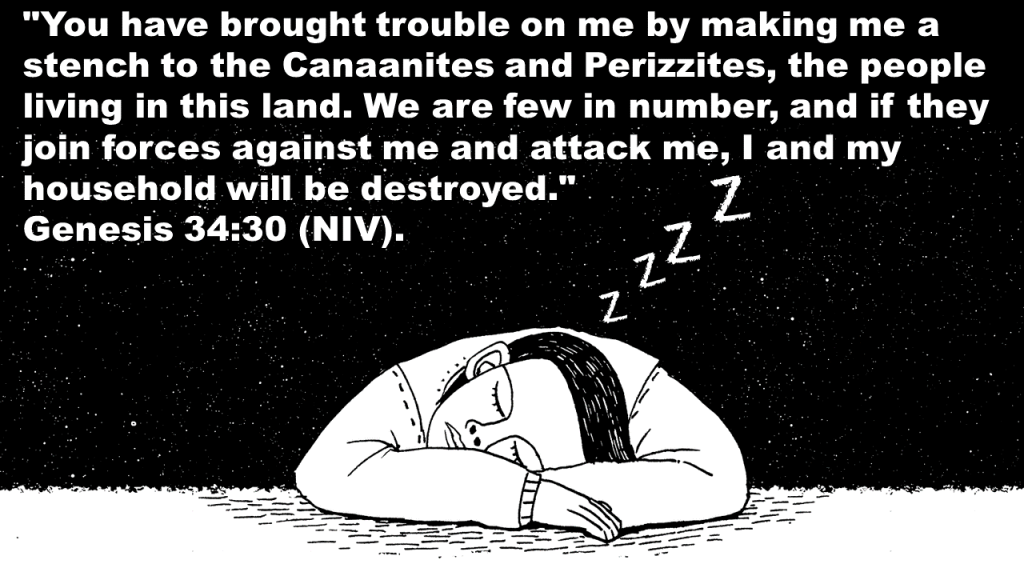
How do I know that? Well, because the next thing that we are told is, “Then God said to Jacob, “Go up to Bethel and settle there, and build an altar there to God, who appeared to you when you were fleeing from your brother Esau.” (Gen. 35:1) God hadn’t left Jacob but bad things sometimes happen when you choose to ignore God and do things your own way.
For God the destination was nowhere near Shechem. Jacob had again drifted off course, and bought the land and set up camp. So God reminded yet again… “go to Bethel and settle there”. To the place where we began this journey. Go back to the beginning. That’s the right place to be. Fulfill your end of the deal Jacob!
That’s what we must do when we refuse to listen or heed the LORD’s directions. Begin again to fulfill our vows to HIM. But take heart from Jacob’s story. God never left him, even as He promised back in Genesis 28:15. God stayed true to HIS word even when Jacob deviated from HIS course. And Jacob finally realized it that very night.
“So Jacob said to his household and to all who were with him, “Get rid of the foreign gods you have with you, and purify yourselves and change your clothes” (2).
What foreign gods was he referring too? The ones that his wife Rachel had stolen from her father perhaps? Or the plunder that Jacob’s son got from Shechem? Likely there too. Though to be fair to the text, no gods are specifically mentioned in the loot. But regardless of where the gods came from Jacob knew they had to go before he honored his promise to God.
What was that promise again? “..the LORD will be my God” Genesis 28:21 (NIV). And that couldn’t possibly happen with other gods in their possession. They had to purify themselves. Clean house so to speak. Turn away from those things they had followed and turn wholehearted to God. Because Jacob now knew this was no coincidence but truly the God of Abraham calling them to come to HIS house.
So Jacob invited his family to “come, let us go up to Bethel, where I will build an altar to God, who answered me in the day of my distress and who has been with me wherever I have gone”(3). Which day of distress? Chapter 32, right? But even more so the whole time he was on the run.
His whole family knew this testimony because they watched their father’s God deliver them from both Laban, as well as Esau’s wrath. Jacob didn’t seem to need to plead with them.
Verse 4 says, “…they gave Jacob all the foreign gods they had and the rings in their ears, and Jacob buried them under the oak at Shechem.” Why the earrings? Well in those days earring were talisman or lucky charms if you prefer that term. They were in essence idols. And “our God is a jealous God. You shall have no other gods before HIM. You shall not make for yourself nor adorn yourself with any object of worship”. (cf. Ex. 20:3-4) If they were to commune with God it would have to be on HIS terms.
“Then they set out, and the terror of God fell upon the towns all around them so that no one pursued them” (Genesis 35: 5 (NIV). They had to step out in faith even after Jacob had told them that their actions would cause all his enemies to band together and destroy them. (Which by the way was fear speaking on Jacob’s part and not faith nor prophetic utterance). Just because you are a person of faith doesn’t mean that you don’t express fear. You just don’t remain encamped with it. “They set out”.
And God was still true to HIS promise. God made sure that they were able to travel to Bethel without incident. How “the terror of God fell” is not completely clear from the scriptures.
Though fear is often the handiwork of Satan, God may have used what the boys did in Shechem as a witness to anyone who might want to try to attack them on route. News of such a massacre would certainly have traveled fast along the grapevine. But God had other means at His disposal for instilling terror in the hearts of man.
Back at the beginning of chapter 32 we find, “Now as Jacob went on his way, the angels of God met him” (Genesis 32:1 (NASB). It’s an odd reference and not much more is said about it other than Jacob named that places “two camps”. So God may have supernaturally intervened on Jacobs journey to Bethel by having those Angels show up at just the right times and spots knowing full well that man’s usual response to supernatural visitations is terror or fear. But any way you look at it God was faithful to his promises from the beginning to the end of Jacob journey.
Jacob on the other hand? Well he was learning to be faithful all journey long and we can see a marked improvement in faith from beginning to end.
So how is your journey showing more faith? Are you keeping covenants you have made? If we have learned nothing else from this part of HIStory we can see that God clearly waits for you to do so. As ex-slaves to sin we need to realize we cannot fully enjoy our freedom until we fulfill our promises before God and man.
Read our focus passage Genesis 35:1-5
- Have you ever made a promise you later regretted?
- Does God keep track of promises and vows we make to him?
- Do circumstances allow us to renege on our promises to God and others?
- How important is it that we know the context of a passage before making it a principle or guiding factor in our life? (Heb. 11:1)
- What has happened in Jacob’s life since he began the journey in Genesis 28:22? What is the context of our passage today? Who? What? When? Where? (See my notes here for help on this.)
- Do you think Jacob meant to fulfill what he vowed in Gen. 28:21-22?
- Does God really hold you to your word when you make those sort of deals with Him?
- Who was it that initiated the conversation in Genesis 35 verse 1?
- Most English Bibles begin this chapter with a time reference as though it continues the previous thought. Why is it important to understand this?
- How many years had passed between Chapter 28 the start of the journey and chapter 35?
- Had God fulfilled his promise of Genesis 28:15?
- Had Jacob fulfilled his promise of Genesis 28:21-22 by chapter 35?
- What specific instruction did God give Jacob in Gen. 35:1? (See also Gen. 31:3, 10-13).
- What did Jacob do in response? Gen. 35:2, 4,5
- What idols was Jacob referring to in Gen. 35:2?
- Why did Jacob take and bury the things he collected? (Gen. 35:3-4; answer is found in Gen. 28:21, see also Exodus 20:3-5.)
- Why did a great terror come upon the people in Genesis 35:5?
- What does the Bible say about keeping your word? (Numbers 30:1-16, 32:24, 30:1-2; Lev. 5:4-5; Deut. 23:23; Ecc. 5:4-7; Psalm 15:1-4; Psalm 89:34, 1 John 2:5; Matthew 5:33-37; Acts 5:1-10; James 5:12)
- What should you do if you made a hasty promise but realized it was inappropriate of you to do? (Proverbs 6:1-3)
- What promise do you need to fulfill beginning this week?



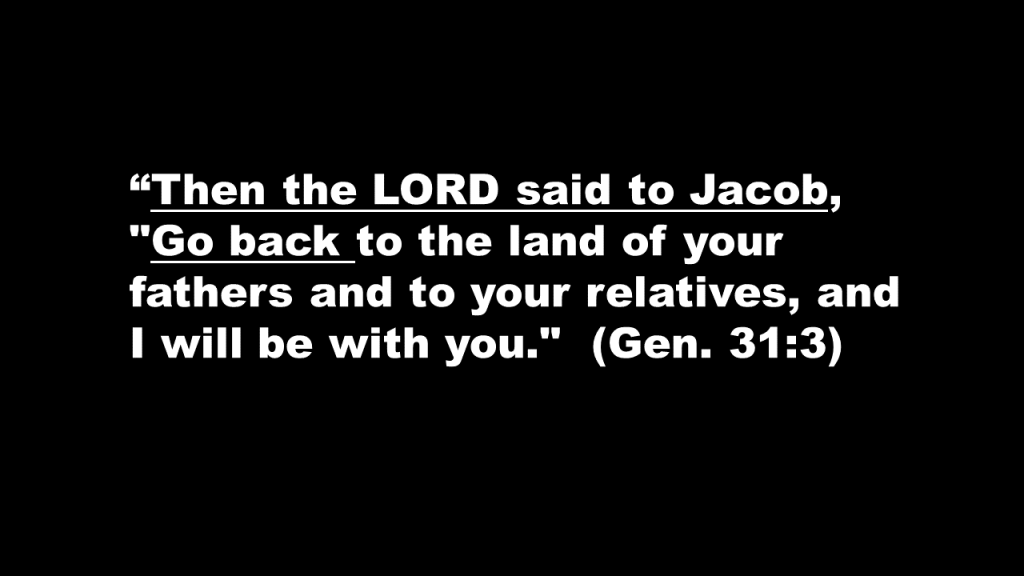

You must be logged in to post a comment.